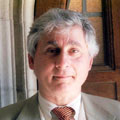非常抱歉,
你要访问的页面不存在,
非常抱歉,
你要访问的页面不存在,
非常抱歉,
你要访问的页面不存在,
验证码:

职称:professor
所属学校:Princeton University
所属院系:Department of Sociology
所属专业:Sociology
联系方式:609-258-1971
I have studied the impact of “cultural capital” -- familiar and comfortable relationships to prestigious forms of culture – on educational attainment, and found that high-school students high on this dimension more often graduate from college and marry better educated spouses than otherwise similar peers. I have also studied how people use social networks for significant purchases: homes, cars, legal assistance and home repairs. The market turns out to be far from impersonal: many Americans know their transaction partners personally, and those who do are more satisfied than others with the outcome. Now I am studying the impact of social class on use of new digital technologies and the connection between Internet use and income. High-status people more easily gain access to new technologies, and they employ them to reinforce their economic advantage. Yet all is not grim: working-class young men who are high in cultural capital are more likely to move into the middle class; the well-educated and prosperous have no lock on the social networks that lubricate market exchange; and young people have used their command of new technologies to move ahead more swiftly in the workplace. My research has helped me better understand both the tenacity of social distinction and the permeability of the class structure.
I have studied the impact of “cultural capital” -- familiar and comfortable relationships to prestigious forms of culture – on educational attainment, and found that high-school students high on this dimension more often graduate from college and marry better educated spouses than otherwise similar peers. I have also studied how people use social networks for significant purchases: homes, cars, legal assistance and home repairs. The market turns out to be far from impersonal: many Americans know their transaction partners personally, and those who do are more satisfied than others with the outcome. Now I am studying the impact of social class on use of new digital technologies and the connection between Internet use and income. High-status people more easily gain access to new technologies, and they employ them to reinforce their economic advantage. Yet all is not grim: working-class young men who are high in cultural capital are more likely to move into the middle class; the well-educated and prosperous have no lock on the social networks that lubricate market exchange; and young people have used their command of new technologies to move ahead more swiftly in the workplace. My research has helped me better understand both the tenacity of social distinction and the permeability of the class structure.